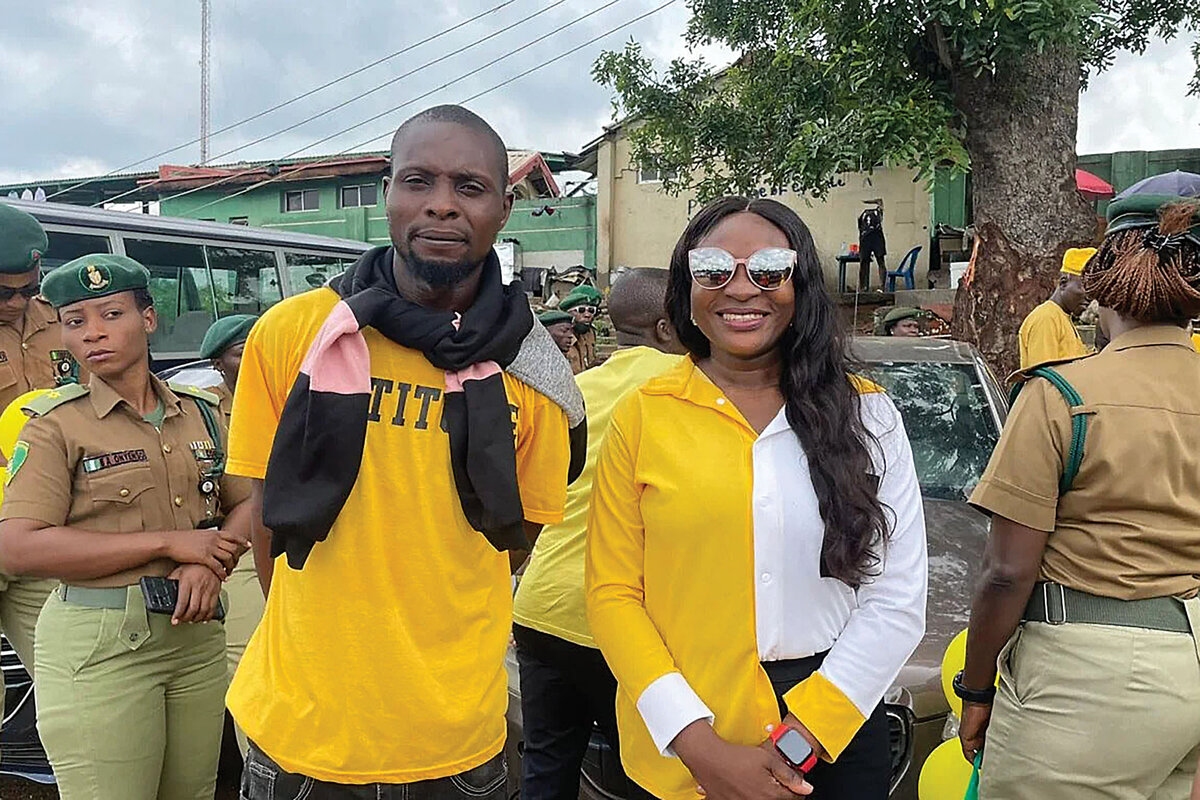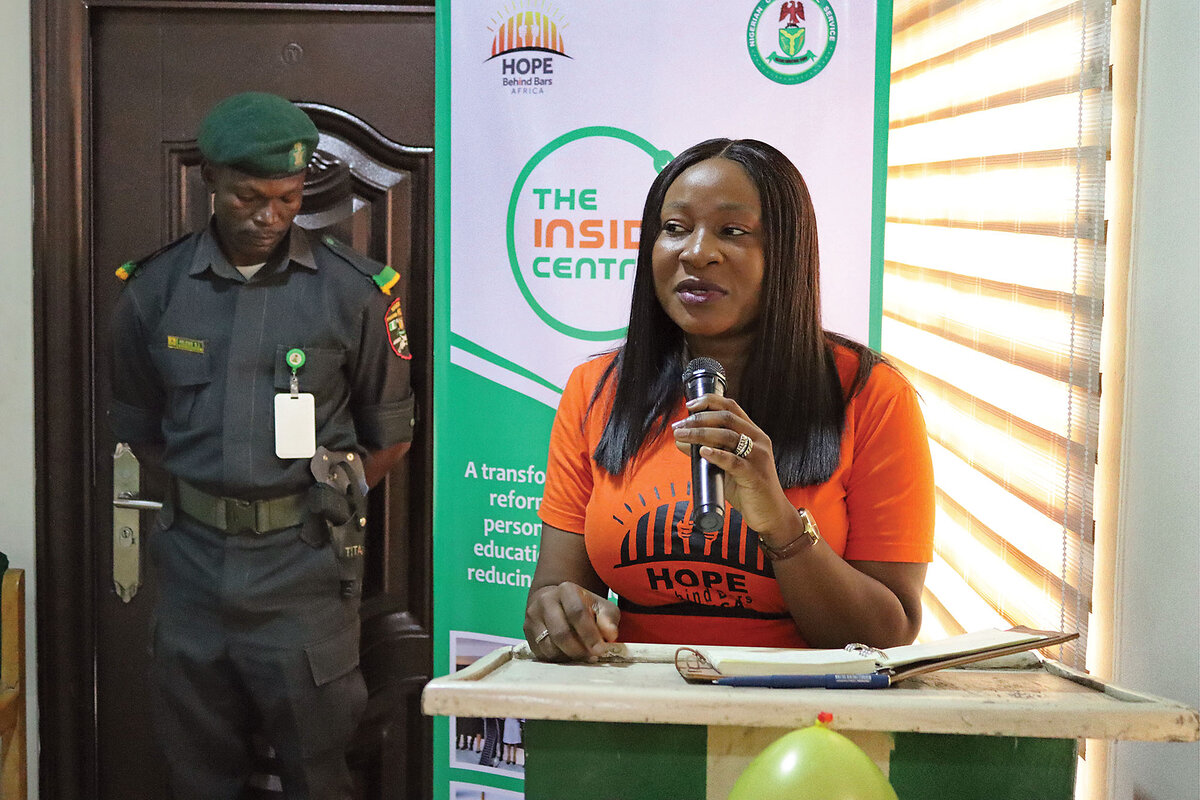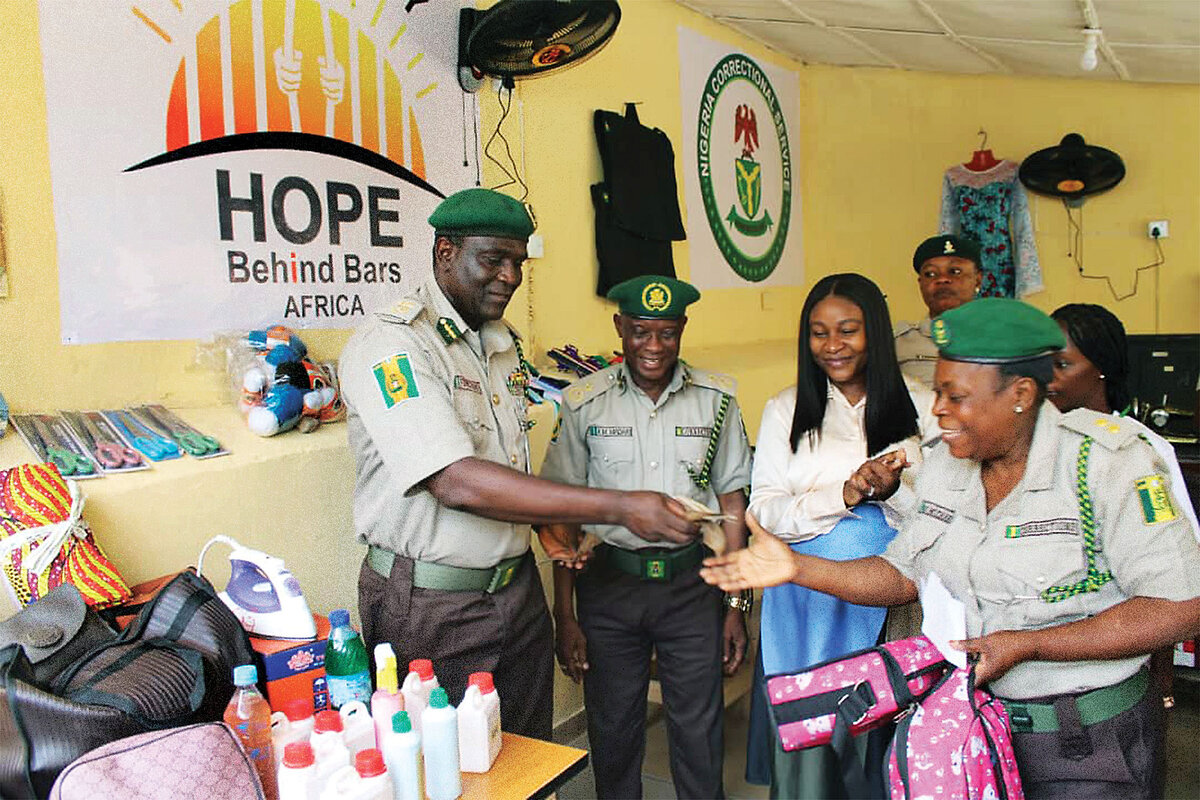Her father was unfairly arrested in Nigeria. Now her nonprofit fights for others.
Loading...
| Abuja, Nigeria
Oluwafunke Adeoye recalls that when she was 7 years old, her sailor father was unjustly arrested at his employer’s behest in Nigeria and detained for weeks without access to a lawyer. The ensuing financial strain took a toll on the family, forcing Ms. Adeoye to skip school for a year.
“I remember, even as a child, whenever my dad spoke about the incident, [there was] his constant wish that he had someone to represent him,” she says. Her father’s ordeal inspired her commitment to become a lawyer and provide legal aid to others.
Why We Wrote This
A story focused onUnfair imprisonment is an immense problem in Nigeria. One nonprofit organization is fighting for the rights of defendants.
The nonprofit she founded in 2018, Hope Behind Bars Africa, offers free legal services to indigent Nigerians. Many of them are unjustly detained by police and unable to afford bail or legal representation. HBBA has offices in 12 of Nigeria’s 36 states. Its team of more than 200 volunteer lawyers is spread across the country’s courts and prisons.
HBBA lawyers and other staff members face hostility from police officers who perceive them as enemies, but “we are constantly trying to let them know that we are all in the business of ensuring justice is served,” Ms. Adeoye says.
In August 2014, Christian John boarded a bus from Nigeria’s capital, Abuja, to get back to his studies two hours away at Government Technical College Kajuru. A few minutes into the ride, the vehicle broke down, and as the passengers waited for the problem to be fixed, armed federal police from the Special Anti-Robbery Squad (SARS) swarmed them.
“When I tried to inquire what was going on, they slapped me and asked that I keep quiet,” Mr. John recalls.
The officers handcuffed Mr. John, and then bundled him and the other passengers into a waiting van that zoomed off to the police station. “It was the most traumatic experience of my life,” he says. “I didn’t understand what was happening or know what to do.”
Why We Wrote This
A story focused onUnfair imprisonment is an immense problem in Nigeria. One nonprofit organization is fighting for the rights of defendants.
SARS officers, notorious for conducting arbitrary raids, demanding bribes, and perpetrating other abuses, accused Mr. John of robbery and conspiracy. Though he maintained his innocence, he lacked money to bail himself out of the police station’s jail and spent more than half a year there before finally appearing in court.
The court remanded him to prison, where Mr. John served four years until the nascent nonprofit Hope Behind Bars Africa (HBBA) heard of his case during a prison visit and got him to appear again before a judge.
“I gained my freedom,” Mr. John says, the gratitude evident in his voice.
A common plight
HBBA offers free legal services to indigent Nigerians, many of whom are unjustly detained by police and are, like Mr. John, unable to afford bail or legal representation. HBBA has offices in 12 of Nigeria’s 36 states. Its team of more than 200 volunteer lawyers is spread across the country’s courts and prisons.
“Sometimes people tag us on a case on social media,” says Oluwafunke Adeoye, a lawyer who founded HBBA in 2018. Other times, HBBA hears of cases during routine prison visits.
The scale of the problem that HBBA is fighting is immense, Ms. Adeoye notes.
In Nigeria, more than 104 million people – almost half the population – live in poverty. Accessing legal representation can rise to 700,000 naira (about $500), or almost two years’ earnings for a minimum-wage worker. This means the most vulnerable people are caught in a cycle in which they lack the resources to fight back against police officers’ unfounded accusations or requests for bribes. A 2019 survey by the United Nations Office on Drugs and Crime found that more than a third of bribes paid in Nigeria went to police officers.
The situation is compounded by a slow-moving judicial system. Data from the Nigerian Correctional Service shows that at least 69% of the prison population, representing more than 54,000 incarcerated people, is awaiting trial.
A passion rooted in injustice
HBBA has its roots in Ms. Adeoye’s childhood experience. When she was 7 years old, Ms. Adeoye says, her sailor father was unjustly arrested at his employer’s behest and detained for weeks without access to a lawyer. The ensuing financial strain took a toll on the family, forcing Ms. Adeoye to skip school for a year. “I remember, even as a child, whenever my dad spoke about the incident, [there was] his constant wish that he had someone to represent him,” she says. Her father’s ordeal inspired her commitment to providing legal aid to others.
While working at a law firm in Lagos in 2013, Ms. Adeoye was part of a team that supplied legal services to 14 men accused of conspiring to murder police officers. “Red flags emerged immediately [when] we saw the case file,” she says. “The bodies were never found, and the defendants only met ... the first time at the police station.”
The case dragged on to the Court of Appeal, where all 14 of the accused were acquitted. “I felt like, ‘Wow, I just saved these people literally from death,’” Ms. Adeoye says. “It solidified my commitment to using the law to protect the vulnerable.”
Against a powerful tide
The Special Anti-Robbery Squad, which formed in 1992, had long terrorized Nigerians. In October 2020, thousands of Nigerians took to the streets in what are now referred to as the #EndSARS protests, which quickly led to the dissolution of SARS.
Still, police abuses persist, and public funding for legal aid to indigent people is insufficient to meet the need. The work of nonprofit organizations such as HBBA is therefore critical, says Jonathan Ugbal, a journalist and human rights activist.
Mr. Ugbal notes that the lack of digitization of records is one factor that can lead to cases dragging on in the courts for years. He praises HBBA for facilitating settlements outside court.
“This benefits everyone involved,” he explains. “Defendants facing lengthy trials can find faster resolution, and the courts can free up judges and resources for other cases.”
HBBA represents clients facing various charges, including street hawking of goods, loitering, and prostitution. For these cases, Ms. Adeoye explains, the organization prioritizes diversionary measures. “In one instance, two boys were arrested for loitering near an army general’s residence,” she notes. After HBBA contacted the homeowner and got the boys to apologize, the charges were dropped.
In felony cases such as robbery or murder, HBBA works to make sure that Nigeria’s laws ensuring fair trials are followed. For example, a defendant can get a case dismissed “if the complainant fails to diligently pursue it, such as by repeatedly missing court appearances,” Ms. Adeoye explains. This was how HBBA ultimately secured Mr. John’s release.
Mr. Ugbal also highlights the issue of prison crowding and how HBBA is working to ease it. Nigerian prisons hold 37% more individuals than their capacity, hindering rehabilitation efforts. “Imagine the positive impact on prison conditions as [HBBA lawyers] continue to secure the release of detainees,” he says.
HBBA has represented at least 620 individuals awaiting trial and provided about 1.2 million hours of pro bono legal services. In addition to fighting for reforms in the criminal justice sector, it has helped more than 100 formerly imprisoned people reintegrate into Nigerian society. While HBBA’s work is limited because of funding – it relies on donations to pay transportation costs for its lawyers – the organization remains committed.
HBBA lawyers and other staff members face hostility from police officers who perceive them as enemies, but “we are constantly trying to let them know that we are all in the business of ensuring justice is served,” Ms. Adeoye says.










